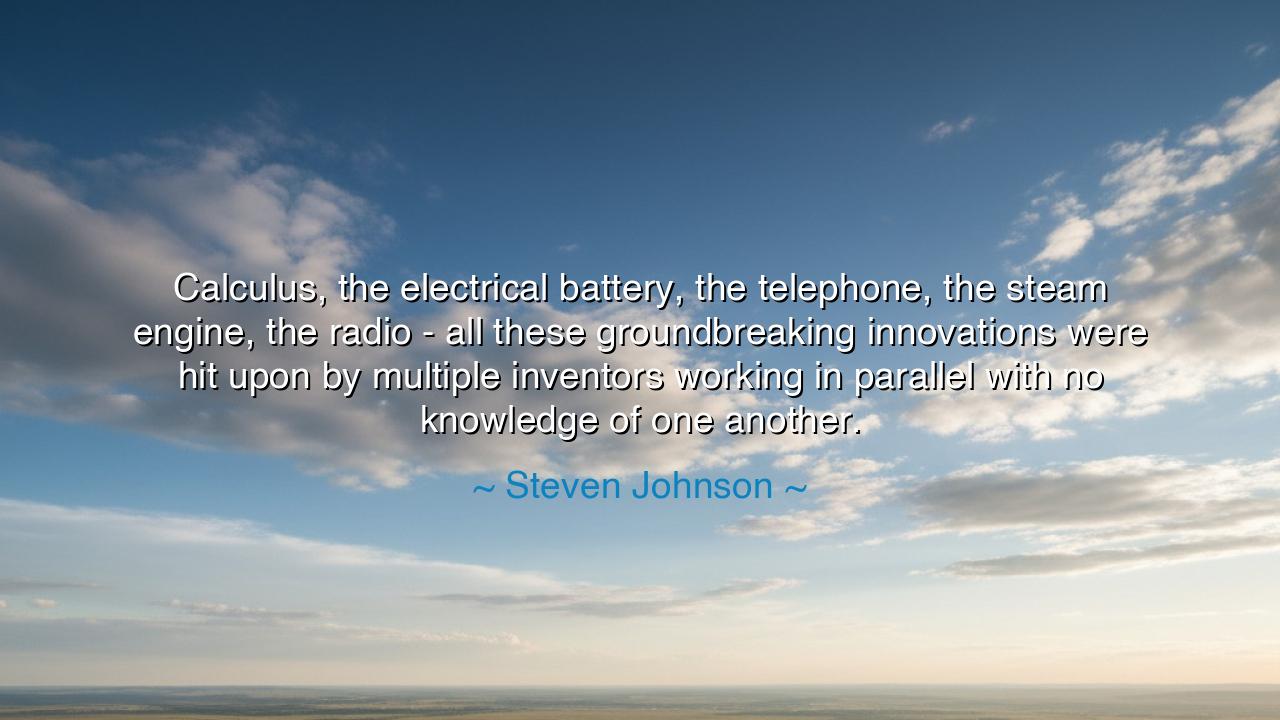
Calculus, the electrical battery, the telephone, the steam
Calculus, the electrical battery, the telephone, the steam engine, the radio - all these groundbreaking innovations were hit upon by multiple inventors working in parallel with no knowledge of one another.






The words of Steven Johnson — “Calculus, the electrical battery, the telephone, the steam engine, the radio — all these groundbreaking innovations were hit upon by multiple inventors working in parallel with no knowledge of one another” — speak to a truth both humbling and transcendent: that the great discoveries of humankind are not the property of one mind alone, but the unfolding of a shared destiny. In this reflection, Johnson reveals a law of creation older than history itself — that ideas emerge when the world is ready for them, and that invention is not born in isolation, but in the mysterious unity of the collective human spirit. His words remind us that genius, though it may wear the face of an individual, often moves through many souls at once, as if whispered by the same unseen muse.
This insight reaches deep into the fabric of civilization, into the ancient rhythm by which humanity grows. Every age has its breakthroughs — its leaps of knowledge and light — yet so often they arise not in one place, but in many. Calculus, for instance, sprang almost simultaneously from the minds of Isaac Newton and Gottfried Wilhelm Leibniz, two men who lived in different nations and worked without collaboration. Their dispute over priority was fierce and bitter, but history shows that the discovery itself belonged to the age — an inevitable flowering of thought born from the needs, questions, and advances of their time. The idea had ripened in the orchard of human understanding, and thus, two hands reached for it at once.
This pattern continued through the centuries. The electrical battery was conceived nearly simultaneously by Alessandro Volta and others experimenting with electricity across Europe. The telephone, that miraculous bridge between voices, appeared in the visions of both Alexander Graham Bell and Elisha Gray, who filed patents within hours of each other. Even the radio emerged from many parallel paths — Marconi, Tesla, Popov — each guided by similar insights, each feeling the same invisible current of inspiration. These are not coincidences but signs of a profound law: that when the conditions of knowledge, curiosity, and imagination align, the same revelation may dawn upon many minds.
To the ancients, this phenomenon would not have seemed strange. The philosophers of Greece and the sages of the East believed that truth already exists in the world, and that men are but vessels through which it reveals itself. Plato spoke of knowledge as remembrance — the awakening of something eternal that already lies within the soul. So too, Johnson’s reflection invites us to see invention as a form of collective remembrance — humanity remembering, through many dreamers at once, what it is capable of becoming. When one mind catches fire, others soon ignite, for the flame of discovery is communal.
The lesson here is not to diminish the individual genius, but to place it within the greater harmony. The inventor, the thinker, the artist — each is a wave upon a vast ocean of shared thought. None create alone, for every breakthrough builds upon the labors, failures, and hopes of countless others. The man who invents the steam engine stands upon the shoulders of miners, mathematicians, blacksmiths, and philosophers. The one who sends sound across the air continues the work of those who once struck stones together to make sparks. The world moves forward not by solitary brilliance, but by the interwoven effort of humanity.
Consider the story of Charles Darwin and Alfred Russel Wallace, who, worlds apart, both conceived the theory of natural selection. Darwin had labored in silence for decades; Wallace, traveling through the jungles of the Malay Archipelago, reached the same insight through his own observation. When Wallace sent his paper to Darwin, the older man was struck not with jealousy, but awe — for he saw in that moment that the truth he had uncovered was not his alone. The age had given birth to it. Nature itself had spoken through more than one voice, as it always does when the time is ripe.
Thus, Johnson’s reflection becomes more than a comment on science; it becomes a parable of human progress. It teaches us that the current of inspiration flows through all, and that the work of the thinker is not to claim ownership, but to serve as a vessel through which new truth enters the world. It tells us that ideas are like seeds scattered by the wind — some fall in one field, some in another, but all bloom beneath the same sun. The true glory of invention, then, is not in being first, but in being faithful — faithful to the act of discovery, to the labor of learning, to the quiet voice of wonder that calls us ever forward.
The lesson we must take is this: do not wait for genius to strike as lightning from heaven; prepare the ground of your mind, for when the world ripens, it is those ready to receive who become its instruments. Share knowledge, collaborate, and seek truth together, for the next great discovery may already be rising — not in one mind, but in many. And when it comes, as it always does, remember the wisdom of the ancients and the insight of Steven Johnson: that in every age, humanity creates not alone, but in concert, guided by the unseen harmony that binds all who seek the light of understanding.






AAdministratorAdministrator
Welcome, honored guests. Please leave a comment, we will respond soon